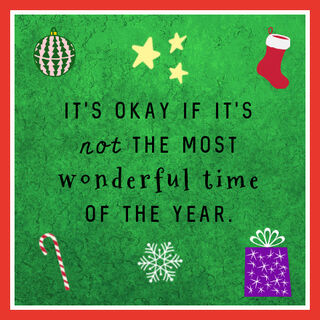Depression
Moving Through The Holidays With Depression
It's okay if it's not the most wonderful time of the year.
Posted December 21, 2021 Reviewed by Kaja Perina

You wish it was the most wonderful time of the year but... it isn't.
And that's okay.
When you live with depression - or any chronic illness - it's best to set realistic goals about celebrations and festivities.
Navigating the holidays is a challenge for most of us. And, now, adding pandemic restrictions and supply chain delays makes for even more stress than usual. But for those of us who have to balance our mental health everyday, it can become an insurmountable goal to have a wonderful holiday season. In fact, the National Alliance on Mental Illness reports 64% of people with mental illness report the holidays make their conditions worse.
Mindful Holiday Season
I like to remind my patients, and myself, to have a mindful holiday season. This means keeping an eagle eye on your own well-being, while looking after holiday traditions and celebrations along the way. Making a conscious effort to be more present on your self-care during high octane times is easier said than done. It requires you to make self-care a priority. And to give yourself permission to not feel wonderful, merry and festive if the season feels chaotic, anti-climactic or joyless.
One of the main reasons the holiday season is challenging for people with depression is because it can be hard to keep up with the traditions, rituals and expectations. Sometimes mental illness leaves us feeling fatigued or cognitively drained. Depression can make it hard to summon feelings of joy or nostalgia. Or if we do feel those emotions, they are fleeting and we find ourselves back at low ebb again. Other issues like seeing family where conflicts often happen can trigger setbacks. The expectations of gifts can add financial stress. And then there are individuals who feel disconnected, lonely and unseen by others during holiday times.
Tips for Self-Care
Keep things simple: Scale down your schedule during the holiday season. Aim to keep things small and simple so you don't get too lost in the holiday hoopla. Consistency is important in your treatment plan when you live with mental illness. When we do too much, we risk failing to meet our daily treatment goals.
Combat loneliness: If you're alone or have chosen to avoid holiday celebrations, make sure you surround yourself with meaningful activities. Just because you've chosen not to spend time with others, it doesn't mean you can't find enjoyment during the holidays. Volunteering, reaching out to trusted friends, cozying up with a book, watching uplifting movies or taking up a new hobby can help.
Set limits: Make sure you let others know what your needs are - be it quiet time, a gift budget, what you can and can't do during this season. Share with trusted others what issues trigger you and how they may help you navigate these situations.
Delegate: Ask others to help with holiday issues. Delegate gift shopping, food prep or who has to pick up Aunt Sally. Say, "No," when you can - and "I have to think about that" if you can't draw a line in the sand at that moment.
Self-care: Remember to put your mental and physical well-being first. Make sure you follow your treatment plan, take your medications, eat and sleep well, exercise and destress whenever possible. Pamper yourself. Feed your senses. Indulge in moments that focus on wellbeing.
Plan a recovery day into your schedule: After a day or night of holiday festivities, try to schedule a recovery day. Having a day to rest, refuel and reboot can help avoid setbacks or relapses.
Look forward: Instead of dwelling on the holiday season’s end, or how un-wonderful it was, choose to look forward to the coming year. Build in realistic goals and mark moments in your calendar to celebrate on your terms.


